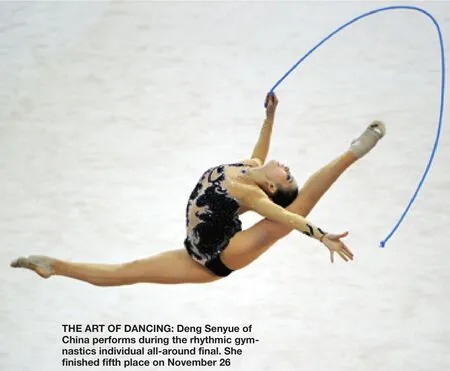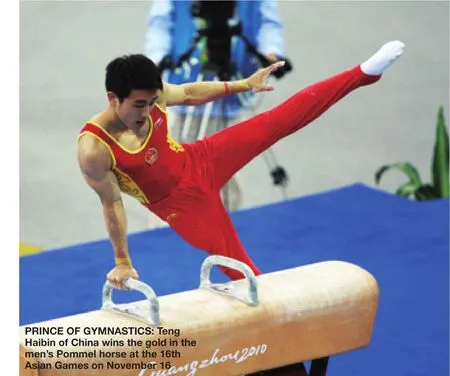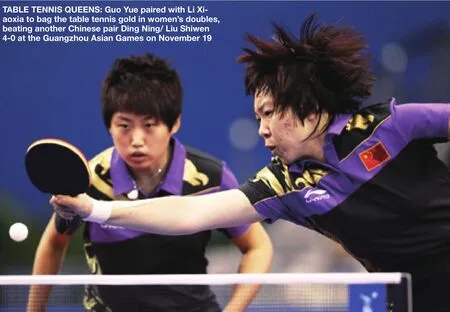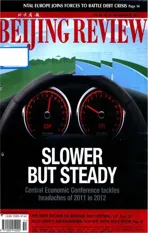Old and Young, Equally Shining
2011-10-14ByYINPUMIN
By YIN PUMIN
Old and Young, Equally Shining
By YIN PUMIN
Veterans and newcomers make the Asian Games a wonder
China has concluded its showing at the 16th Asian Games in Guangzhou,Guangdong Province, but those people who shed tears, sweat or even blood during the competition, will be remembered for decades.
They include comeback stars, who had fallen off the peak but refused to quit, and rising talent, who showed their potential at the Games and will grow into the backbone of the country’s sports.
Flying again
Chinese star hurdler Liu Xiang, one of the most spotlight-catching athletes at the Games, returned to his old form with a record-breaking performance.
The former world record holder and Olympic champion, the country’s first major track star, claimed the men’s 110-meter hurdles gold medal.
The 27-year-old, whose attendance attracted almost 80,000 spectators to the Guangzhou Aoti Sports Center, staged a dominating performance by leading the race from the very fi rst second. Liu established a decisive advantage after conquering the third hurdle, and kept extending his lead until he fi nished the competition.
He won his third Asian Games title in a row with a new Asian record of 13.09 seconds.
Liu, the first Chinese man to win an Olympic sprint event, limped off the field at the National Stadium, or the Bird’s Nest,at the 2008 Beijing Games even before he started running in the fi rst heat, leaving millions of Chinese fans dumbfounded with the blow.
He was later treated in the United States,receiving surgery on his right Achilles’ tendon.
This time’s winning result was his best since he made a comeback in September 2009, when he ran with 13.15 seconds in Shanghai.
In March this year, Liu only managed a seventh-place fi nish at the world indoor championships in the shorter 60-meter hurdles.
Two months later he pocketed a bronze at a Diamond League meet in his hometown Shanghai.
“My coach always has confidence in me. I am con fi dent of myself too,” said Liu.“There’s still a gap between my current form and how I was at my peak, but I have time to improve. I believe I can still run inside 13 seconds and I’m con fi dent I can get back to my peak.”
Keeping growth
Veteran Teng Haibin showed there was still life in the old dog as he emerged as the most successful men’s gymnast on a starstudded Chinese team at the Guangzhou Asian Games.
With three gold medals and a bronze at the Games, the former Olympic champion has rediscovered his confidence and now has his sights set on next year’s World Championships and the 2012 London Olympics.

“It has not been easy,” Teng said of his recent struggles. “It’s a new start for me.”
In Guangzhou, Teng helped the men’s squad win the gold for the 10th successive time. He was also crowned the all-around champion. On the individual apparatus,he claimed gold on the pommel horse and bronze on the horizontal bar.
The Asian Games have been a lucky competition for Teng as he rose to international prominence at the Busan Asian Games eight years ago. There, the 17-year-old pocketed three gold medals in men’s team,pommel horse and horizontal bar.
He went to the 2004 Athens Olympic Games with high expectations, but his luck turned.
After winning gold on the Pommel horse, China’s only gymnastics gold medal at that Games, Teng fell from the high bar in the team competition.
The failure hurt him deeply and he almost disappeared from the international stage.
“The gold medal on the Pommel horse could not hide my mistake in the team event,” Teng said. “The whole team worked hard for that gold for four years, but my mistake cost us all.”
At the 2008 Beijing Olympic Games, the Chinese men’s team reclaimed its crown by winning the gold, but Teng could only share the excitement in front of the television.
“I had mixed feelings at that time. On the one hand, I was very glad to see our victory,but on the other, I was disappointed with myself. I didn’t know what to do next,” said Teng.
After the Beijing Games, Teng took a long vacation and thought about retiring from gymnastics. But he decided to return at the end of 2008.
“I asked myself many times whether to continue or not,” said Teng. “If I left, I felt I would have been a failure, even though I was an Olympic champion.”
China ruled the swimming pool this time by winning 24 gold medals out of the total 38 events
Rising stars
Fortunately for Chinese sports, the most moving moments of these Games are not just about the past.
Lao Yi, a 25-year-old local athlete,turned out to be the brightest freshman on the international stage.
The sprinter led the team to the 4x100-meter gold after becoming the fi rst Chinese to lift the men’s 100 meters at the Asian Games.
China ruled the swimming pool this time by winning 24 gold medals out of the total 38 events. Its young swimmers startled their rivals and conquered the pool.
Chinese teenagers Sun Yang and Ye Shiwen emerged as gold hopefuls for the 2012 London Olympics.
Sun, 18, who came in second place in the men’s 200-meter and 400-meter freestyle events to South Korea’s Olympic champion Park Tae-hwan, fi nally outshone his rival in the 1,500 meters. He dominated the longest event in 14:35.43.
The time was 0.87 seconds behind the world record of 14:34.56 set by Australian Grant Hackett in July 2001.
China claimed all but two women’s gold medals in the pool after six days of competition, with 14-year-old Ye winning two,prompting speculation she will make a big splash at the London Olympics.
Ye eased to victory in the women’s 200-meter individual medley in 2:09.37 on November 18, adding to the 400-meter individual medley title she won on November 14.
China claimed the gold medal at the women’s 100-meter freestyle relay. Chinese teenager swimmers all performed well and led throughout the race.
On November 17, 17-year-old Tang Yi won her fourth gold and sixth medal overall,taking the women’s 100-meter freestyle.

PHOTOS BY JIANG XIAOYING

